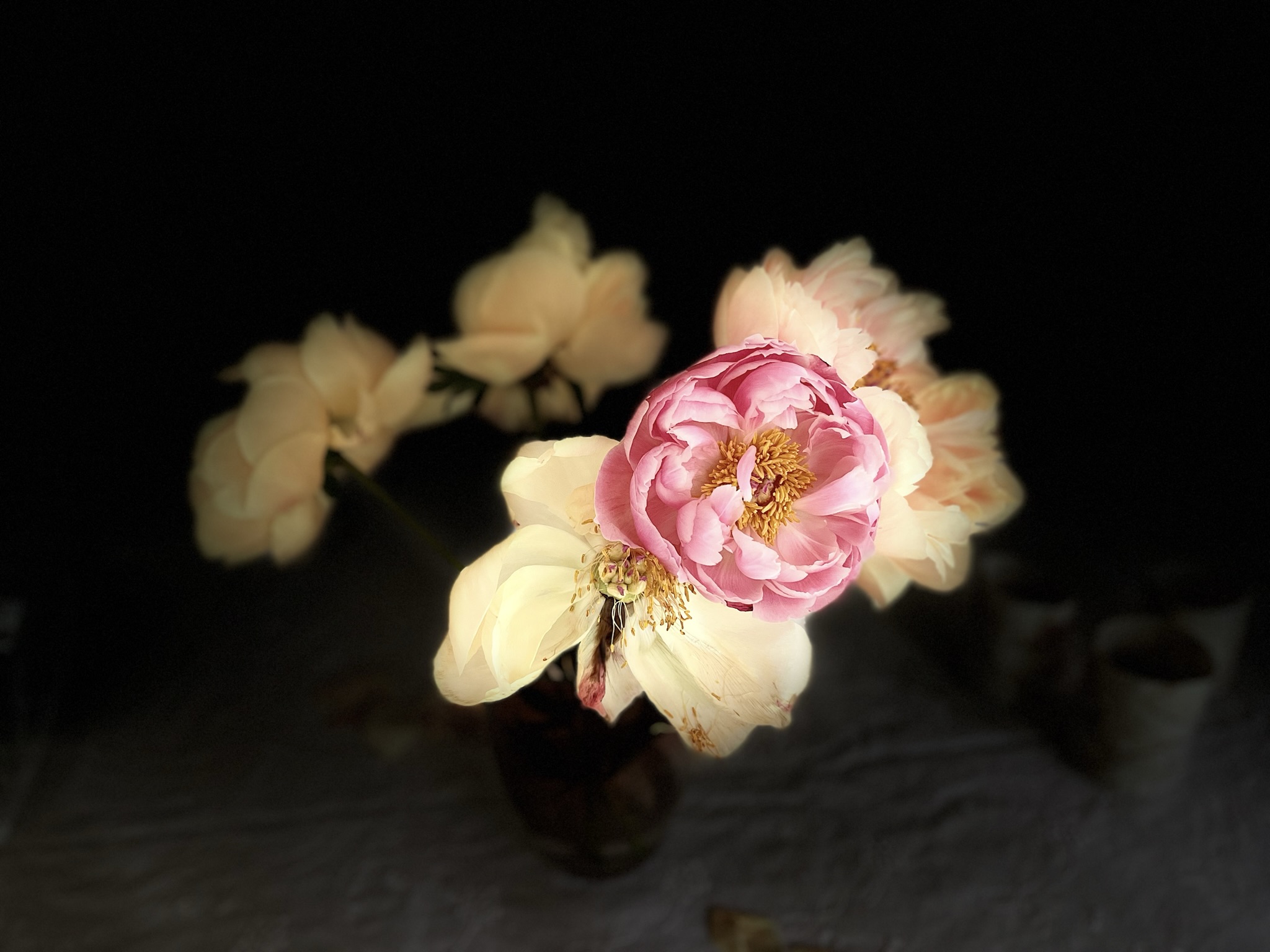1: a sudden spasmodic effort that accomplishes nothing
2: one that appears promising but turns out to be disappointing or worthless – Merriam Webster

William Merritt Chase Peonies 1897
This was me, last week. Sort of. Make the hair white, make the peony bouquet more modest, make it camera in hand instead of fan, and you’ve got the picture. Peonies have been a magnet for visual artists across centuries. They are lush, come in a range of colors, can be arranged in dramatic tableaux. And when the petals fall, they serve as a perfect memento mori. It doesn’t hurt that they last in the garden only for a short time. The fleetingness spurs desire to create something more lasting.

Here are some of my favorite paintings, as per usual the European fare I grew up with, Dutch, Russian and French masters.
Vincent Van Gogh Roses and Peonies (1886)


Pierre Auguste Renoir Peonies (1880) Eduard Manet White Peonies (1864)


Henri Fantin-Latour Vase of Peonies (1881) Alexander Gerasimov Still live with peonies (1950)
No massive bouquets for me, at $3 per stem, but the five I ended up with held a wonderful surprise in store. I had unwittingly bought Paeonia Coral Charm, a peony variety known for its color transformation while blooming. (Photographs are all of the same bouquet, across a week or so.)


The variety was registered in 1964 and colors switch from coral to cerise, orange and, finally, white across its lifespan, in the vase as much as on the stem in the garden. Quite a spectacle to behold.


Peonies are a flash in the pan – they come and go in the garden in the blink of an eye. That phrase, flash in the pan, has its origins debated. Some say it originated in the 17th century when Flintlock muskets held small amounts of gunpowder in a pan. When the power flared up without a bullet being fired, it was called a flash in the pan. Others claim it has to do with the experiences during the Gold Rush of the 19th century. Prospectors’ excitement when they saw something glint in the pan was dashed when it did not turn out to be gold.



In any case, for a moment I had had high hopes that one could use the phrase regarding UK Prime Minister Boris Johnson – alas, he did survive the no-confidence vote on Monday, albeit facing a substantial rebellion and a weakened leadership position. I’m not going to bore you with details of my distaste for the man (and his party’s politics) but instead share something that brightens my days occasionally.

There is someone on Twitter called “Shakespeare Replies” – @TheBardAnswers.
He or she provides appropriate citations from Shakespeare’s works for current political situations and is about as much a fan of Johnson as am I…

I have collected some of the ones that made me laugh across time – hope you enjoy them as well.

And secondary commentary on Nadine Dorries’ support’



Alas, not always are the text sources referenced, but it is just fun to anticipate when the next one will come along.




Or this one:



And finally, other targets as well:

Shakespeare, of course, wrote about practically every plant there is, except for peonies – at least I could not find anything in my go-to-guide, Botanical Shakespeare, which lists and cross-references the names of plants with the plays, sonnets and everything else. Best of all: they offer planting instructions of the flora appearing in any given play. For June you could chose A Midsummernight’s Dream, for example, and learn which of the mentioned plants are good for your zones, how to plant them and a lot of biological information about them. (All contained in link above.)

Might as well go plant some peonies, given that I cannot use Sonnet 29 for a certain Prime Minister quite yet…
Sonnet 29: When, in disgrace with fortune and men’s eyes
When, in disgrace with fortune and men’s eyes,
I all alone beweep my outcast state,
And trouble deaf heaven with my bootless cries,
And look upon myself and curse my fate,
Wishing me like to one more rich in hope,
Featured like him, like him with friends possessed,
Desiring this man’s art and that man’s scope,
With what I most enjoy contented least;
Yet in these thoughts myself almost despising,
Haply I think on thee, and then my state,
(Like to the lark at break of day arising
From sullen earth) sings hymns at heaven’s gate;
For thy sweet love remembered such wealth brings
That then I scorn to change my state with kings.

And until we can say “So long, Boris,” we’ll listen to “So long, Eric….“






Sam Blair
How ironic that in the Japanese Culture your beautiful peonies represent Honor and Courage.
But from the “mouldy rogue” regarding partygate: “I’d do it again”.
Sara Lee Silberman
Wonderful, rich posting! AGAIN! Kudos/thanks.
Nicky
Fun!! I sent it off to my friend in England!